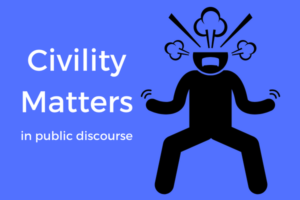 I’ve been writing more about political issues recently. Part of the reason for this is that my interest in politics has piqued in the past few years. Also, it is my belief that the upcoming election in November may be the most important in our history. In fact, I am convinced that our democracy is on the line. And once we lose our democracy, there is no legal way to get it back.
I’ve been writing more about political issues recently. Part of the reason for this is that my interest in politics has piqued in the past few years. Also, it is my belief that the upcoming election in November may be the most important in our history. In fact, I am convinced that our democracy is on the line. And once we lose our democracy, there is no legal way to get it back.
But I have to admit, I’m not always comfortable sharing my political opinions. Politics, along with religion, are often controversial topics. So, when I share my political opinions, I try to be as civil and non-judgmental as possible. My goal is to be part of a meaningful conversation, bringing light, rather than just heat, to the discussion.
Alexandra Hudson is the founder of Civic Renaissance, an intellectual community dedicated to beauty, goodness, and truth. She is a frequent writer and speaker on issues involving civility, and she recently wrote the book, The Soul of Civility: Timeless Principles to Heal Society and Ourselves. Hudson was recently interviewed by Preet Bharara on his podcast, Stay Tuned with Preet. Bharara asked Hudson about how we could interject more civility into our political process and dialogue, which tends to be more uncivil, even violent, now than at almost any time in the past.
Here’s what Hudson had to say:
“My main piece of advice is to talk about politics less. It’s kind of counter intuitive, but in order to save our democracy, to save our public square, we actually have to relegate it to its proper place.
“I argue in the final chapter of my book, it’s called “On Misplaced Meaning and Forgiveness,” that as these traditional touchstones of meaning in modern life , but also across human history—things like friendship, family, faith—they have been on the decline in recent decades. And too often, people have relocated their ultimate source of identity—their meaning—in political issues. They’ve made an idol of religion out of politics. And there are three symptoms of this that I see, and as a result, is bad for our souls and for democracy.
Several symptoms of this misplaced meaning that I see are:
- “That fact that previously apolitical venues now have a political dimension. You know, which sports teams you root for, where you live, where you send your kids to school, where you grocery shop, where you get your newspaper. Politics has invaded every aspect of our lives. That is atypical, and it is not good for our souls, not good for democracy. We’re overdoing democracy and undermining it as a result.
- “Another symptom of this misplaced meaning that I see is the way in which people can go from 0-60, you know, just happy to raging like you’ve never seen before, at the broaching of one issue that is really dear to them, which they feel is being treated with insufficient reverence…Something small is like kindling on the fire of our souls. The frustration builds and builds…
- “The third point is, because we made politics matter too much in our lives, another sad thing that I’ve seen time and time again is the end of life-long family relationships, friendships, people cutting one another off based on who they vote for, their position on XYZ public issue. And that to me is a symptom, as Plato would say, of disordered loves. We’ve let things that are not as important become the most important thing to us. We’ve let that displace real beautiful, central things to the level of happiness and joy in our lives like friendship and family relationships. And we’ve essentialized other people, and degraded them by reducing them to one aspect of who they are, who they voted for or their view on one issue. We have to, in order to do public life better, and life together better, we have to recover a love of things that are nonpolitical and noncontroversial in nature. So, in order to talk better to your uncle at the dinner table about Covid or Donald Trump, maybe you start about a shared love first. If you must talk about those things—and again, my general thoughts and recommendations it to not—but if you must, talk about your kids first, or something joy filled and beautiful. Establish that trust and connection first. Because that is the problem of where we are today. We have no level of trust. We have no level of basic affection for our fellow citizens across differences. And that’s doing a disservice to how we are talking about the hard issues, and how we’re talking about the difference.
“I had the privilege of speaking, just last week, at the Alabama Supreme Court about these ideas (of civility and civil disobedience). It was right next door to Dr. King’s church on Dexter Avenue where he also preached and worked through these ideas. And, just a stone’s throw from where Rosa Parks was kicked off the bus and subsequently arrested for failing to sit at the back of the bus.
“So, I was speaking, as you might imagine, it was a very illustrious group of educators, jurists, and lawyers, predominately white males, and I spoke about protest. I spoke about civil disobedience as a duty of citizenship. I have a whole chapter in my book dedicated to civil disobedience. Sometimes, citizenship requires speaking truth to power, calling out the hypocrisy of an unjust status quo.
“Rosa Parks broke a specific law, a specific Jim Crow-era law, but her conduct was in accordance with what Martin Luther King Jr. might refer to as the eternal, immortal law. She broke a bad law for the sake of a higher principle, upholding the rule of law, the eternal law. We have that obligation to do so as well.
“So, Dr. King is very central to my theory of civility, as a duty of citizenship, and why we have an obligation to speak truth and to take action sometimes—even when it’s costly, even when it’s uncomfortable—but doing so in ways that are still respectful of the dignity and personhood of others.
“The Imago Dei, this notion that man is created in God’s image that was central to Dr. King’s theory of personhood and his whole philosophy of non-violent civil disobedience. It informed his conduct. It compelled him to take action. But it also took certain action off the table, at the same time. For example, he knew that he could never degrade the personhood of another through violence or ad hominem attacks, or through destroying their property. That was dehumanizing. And that would be contradictory and undermine his entire project to begin with. So, Dr. King is central and a hero of civility throughout my book.”
—————————————————
I ‘m not sure how I feel about Hudson’s thoughts. Certainly, I’d like to see more civility in our rhetoric and behavior, particularly in politics. I agree completely with Hudson when she points out that we have elevated politics to a level of importance that has displaced and degraded the normal connections we have to one another through friendship, family, and faith. I think we all have stories, regardless of where we find ourselves on the left-right political spectrum, of damaging or losing relationships with those that used to be an important part of our lives. In my sixty-plus years, I have never seen anything like it.
On the other hand, I’m not sure I can agree with her that the way to inject more civility into our society is to talk less about politics and democracy. With democracy under attack, not just in the United States but around the world, discussing the importance of democracy and how we can save it, seems like an important, even necessary, thing to do.
I’m not saying Hudson is wrong. I’m still thinking about her advice. It’s something that is occupying my mind at the moment, and I’m certain it will continue to be in my thoughts in the coming days. I think increasing civility in our political discourse is worth considering.
